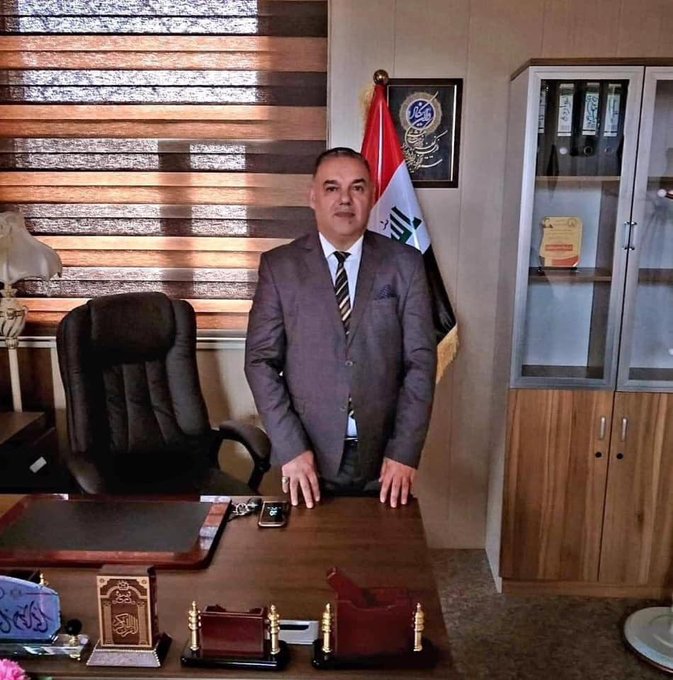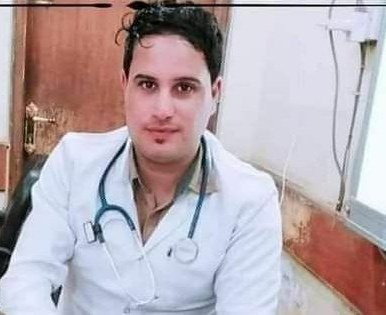No word on whether they discussed the attacks on the Iraqi people. But the Iraqi people continue to be targeted and murdered. Ali al-Mikdam Tweeted:
And:
Azhar a;l-Rubaie (ARAB WEEKLY) notes:
Ali al-Hamami, a lawyer, was one of two activists found dead in Nasiriyah’s Shatra district. The other was Haider Yaser, a young medic and activist who had previously been kidnapped by gunmen. His body was found in Al-Shuyoukh district of Dhi Qar governorate.
The crimes drew the attention of the US Embassy in Baghdad.
“The United States condemns the murder of activist and medic Haider Yaser,” the US Embassy said in a statement. “We share in the sorrow of the Iraqi people mourning his death. The shocking imagery of this brutal crime is horrifying.”
The embassy added: “We add our voice to all those calling for the perpetrators to be brought to justice and we urge Iraqi security authorities to ensure that those engaging in peaceful protest activity be allowed to do so without fear for their lives or personal safety.”
Since the start of the Tishreen movement in October 2019, many activists have been assassinated, for which blame has been directed at Iran-backed militias.
Angry protests to support demonstrators in Nasiriyah have also broken out in other provinces, including the capital Baghdad as well as Babel, Wasit, Najaf, Diwaniyah, and Maysan.
Ali al-Bayati, a member of the Iraqi High Commission said: “What has happened to the security forces is an intimidation message for everyone who wants to stand with protesters. There is a need to investigate the incidence and hold perpetrators accountable.”
Meanwhile GCHR has issued a paper on the protests in the KRG:
Since mid-August 2020, the Kurdistan Region of Iraq has witnessed a widespread mass and popular protest campaign, organised by a group of civil society activists, including teachers and journalists, from various segments of society. They demanded an end to political and financial corruption, improvement of public services, respect for the rights of employees and the payment of salaries that have been delayed for many months due to the continuing financial and economic crisis afflicting the region and Iraq, which in turn led to the deterioration of the living conditions of all citizens. However, the security authorities, instead of responding to the demands of the people, launched a widespread campaign of arrests against civil society activists.
In Sulaymaniyah Governorate, many activists were arrested, but all of them were released after a short period. More than 50 activists were arrested in Dohuk Governorate, and dozens were arrested in Erbil Governorate during the past three months. A number of them have been released at different times, but some of them are still in prisons run by the Asayish forces (Internal Security). Journalists who covered the protests were targeted with excessive force, and a number of them were arrested. The security forces destroyed the equipment of external broadcasts for a number of television channels, a number of which were prevented from covering the demonstrations.
This report by the Gulf Centre for Human Rights (GCHR) documents human rights violations related to the popular protests in Iraqi Kurdistan.
False charges brought against detained activists
The authorities laid false charges against detained civil society activists, including undermining national security, attempting to overthrow the Kurdistan Regional Government, and insulting local authorities.
Ill-treatment of detainees
During recent months, the authorities did not allow the families of detainees, who are held collectively in the Asayish General Prison in Erbil, to visit them, and even their team of volunteer lawyers was not allowed to meet them in prison. This constitutes a clear violation of the United Nations Standard Minimum Rules for the Treatment of Prisoners (the Nelson Mandela Rules).
On 22 December 2020, the team of lawyers defending the detained activists was able to visit five detainees in the Asayish General Prison in Erbil, including teacher and civil society activist Badal Abdulbaghi Barwari, for the first time since his arrest on 18 August 2020. Also, on the same day, teacher and political activist Mullah Shafan Saeed Omar Brushki, the official in charge of the Dohuk branch of the Alliance for Democracy and Justice, called his family for the first time since his arrest on 22 October 2020, and assured them of his health.
On 06 January 2021, for the first time, the authorities in Erbil governorate allowed families to visit detainees, many months after some of them were arrested. The authorities have not yet set a date for the next visit.
A list of names of detained activists
The list below includes the names of detained activists (including their arrest date) from the Governorates of Dohuk and Erbil who have not been released by the security authorities so far:
|
No. |
Profession |
Name |
Date of arrest |
|
1 |
Teacher and civil society activist |
Badal Abdulbaghi Barwari |
18/08/2002 |
|
2 |
Journalist and civil society activist |
Omid Haji Brushki |
18/08/2020 |
|
3 |
Civil society activist |
Tahsin Yassin |
20/08/2020 |
|
4 |
Civil society activist |
Masoud Sinjari |
30/08/2020 |
|
5 |
Teacher and civil society activist |
Karkar Abbas Ali Rostinki (Dosky) |
04/09/2020 |
|
6 |
Civil society activist |
Bahlawan Adel Banavi Barwari |
04/09/2020 |
|
7 |
University Professor |
Jamal Khalil Sindi |
04/09/2020 |
|
8 |
Civil society activist |
Bindawar Ayoub Rashid |
04/09/2020 |
|
9 |
Civil society activist |
Suleiman Kamal Hariki |
06/09/2020) |
|
10 |
Civil society activist |
Suleiman Mousa Zebari |
06/09/2020) |
|
11 |
Civil society activist |
Dr. Amer Dohuki |
06/09/2020) |
|
12 |
Civil society activist |
Walat Jamil Koda |
09/09/2020) |
|
13 |
Journalist and civil society activist |
Sherwan Amin Sherwani |
07/10/2020 |
|
14 |
Teacher and Political activist |
Mullah Shafan Saeed Omar Brushki (Dosky) |
22/10/2020 |
|
15 |
Journalist and civil society activist |
Ayaz Karam Burji |
22/10/2020 |
|
16 |
Teacher and civil society activist |
Hariwan Issa Ahmed |
22/10/2020 |
|
17 |
Journalist and civil society activist |
Kohdar Mohammed Amin Zebari |
22/10/2020 |
The arrest of several Kurds from Turkish Kurdistan in Makhmour district
Kurds from Turkish Kurdistan were also arrested in the Kurdistan Region of Iraq, including 19 refugees who live in the Makhmour refugee camp (also known as the Martyr Rustam Judi camp) located in Makhmour district of Erbil Governorate (the main photo), who were arrested by the security forces on 11 October 2020. They fled the oppression of the security forces in Turkey since the 1990s and have been living since in this camp.
The names of those who were arrested and subsequently released are:
1. Haji Mousa Yildirim
2. Aijan Abdel-Aziz Chalabi
3. Saeed Kara Abdullah
4. Abdulkarim Kara Yousif
5. Sadiq Bulut Ahmed
6. Aiden Siddiq Aiden
7. Orhan Rashid Bulut
8. Roken Siddiq Mohammed
9. Karush Rustum Yakoub
10. Shafan Mohammed
11. Zilan Saleh Sahib
12. Fadr Saleh Sahib
13. Maher Mohammed Amin Spirti
14. Gorbet Mohammed Tong
15. Ihsan Sheikh Suleiman
16. Ashraf Qutbuddin Kurhan
17. Yousif Gamal
18. Robar Sadiq
19. Dalil Gia
They were released on three dates - the first group was released on 12 November 2020, the second group was released on 20 November 2020, and the last group on 30 November 2020. The Camp Relations Committee who provided GCHR with this information also confirmed that three refugees from the camp have been detained by the security authorities in the Governorate of Erbil for a long time. They remain in a prison under the supervision of the Asayish, without any specific charges being brought against them, nor are visits by defence lawyers allowed.
The three detainees are:
1. Othman Nader Haji, date of arrest 06/13/2019
2. Maarouf Aziz Maarouf, date of arrest 12/4/2019
3. Mustafa Mousa Sherine, date of arrest 07/20/2019
Other arrests
On 13 October 2020, the security forces in Shiladze sub-district of Amadiya district in Dohuk Governorate arrested 15-year-old twin brothers Ayman Saadullah Artisi (Dosky) (photo 1) and (Amin Saadullah Artisi (Dosky) (photo 2) on charges that include running a Facebook page calling for demonstrations, demanding employee rights and the improvement of public services. As of the publication of this report, they remain in detention.
On 26 December 2020, the security forces in Erbil Governorate arrested Mazen Hayas, known as (Mazen Jamila) (photo 3), a fifth-year student at the College of Medicine at the University of Sulaymaniyah and the owner of the famous Keto Restaurants project in the cities of Sulaymaniyah and Erbil. This arrest came just one day after he opened his restaurant in Erbil. Reliable local sources confirmed that the Asayish charged him with membership in a political party despite the fact that he does not belong to any political party, and the authorities have not released him so far. Local sources confirmed also to GCHR that the reason for his arrest is his widespread popularity among young people in the Kurdistan region of Iraq, as he provides healthy meals in his restaurants and advises youth groups to maintain physical fitness and follow a healthy, appropriate diet.
On the evening of 24 December 2020, the security forces also arrested journalist Awat Ali (photo 4), director of the Nalia Media Foundation and the NRT satellite channel, at Sulaymaniyah International Airport upon his return from a trip to Sweden. He was released hours after his arrest on the morning of 25 December 2020.
Recommendations:
GCHR calls on the Kurdistan Regional Government to immediately and unconditionally release all those detained in violation of their right to assembly. The authorities must fulfill their constitutional obligations not to violate public freedoms, including freedom of peaceful assembly, freedom of expression, and freedom of the press.
In releated news, Sura Ali (RUDAW) reports:
Iraqi parliament’s human rights committee on Friday called for an urgent investigation into a newly discovered mass grave in Salahaddin province, in which tens of bodies were reportedly found, some belonging to children.
Locals on Wednesday uncovered a mass grave in the town of Ishaqi, which according to the commission contains “hundreds” of bodies.
The Salahaddin Clan Council issued a statement the same day confirming the site’s discovery.
The council’s spokesman Tami al-Majmei told Rudaw English on Saturday that the mass grave “contained the remains of more than 50 people from Salahaddin, including women, and children between 8 and 12 years old.”
He says the presence of women and children is evidence “that militias committed a mass execution of families," referring to units of the Popular Mobilization Forces (PMF, known as Hashd al-Shaabi in Arabic) that he says control security in the area.
In response, Brookings' Ranj Alaaldin Tweets:
More evidence of the crimes against humanity committed by Iran-aligned militias in Iraq: “the presence of women & children is evidence militias committed a mass execution of families, referring to units of the Popular Mobilization Forces that he says control security in the area”
x


